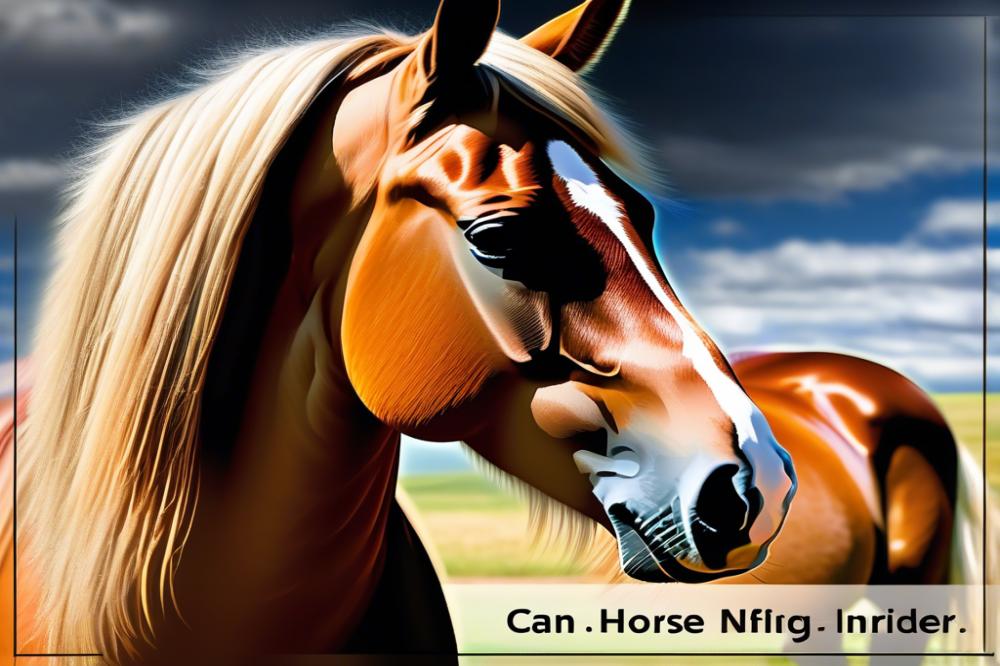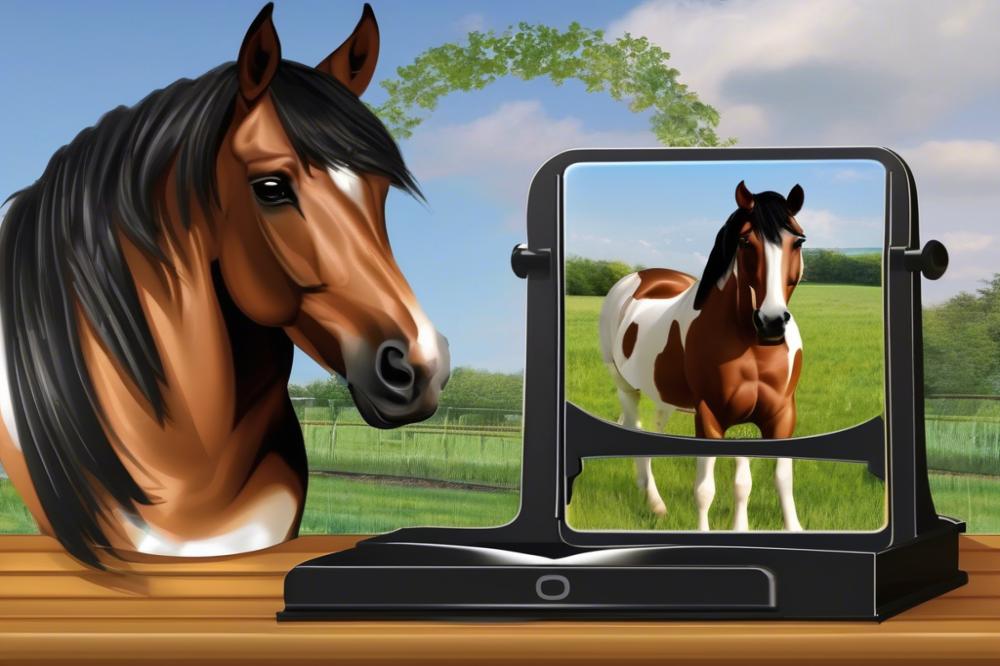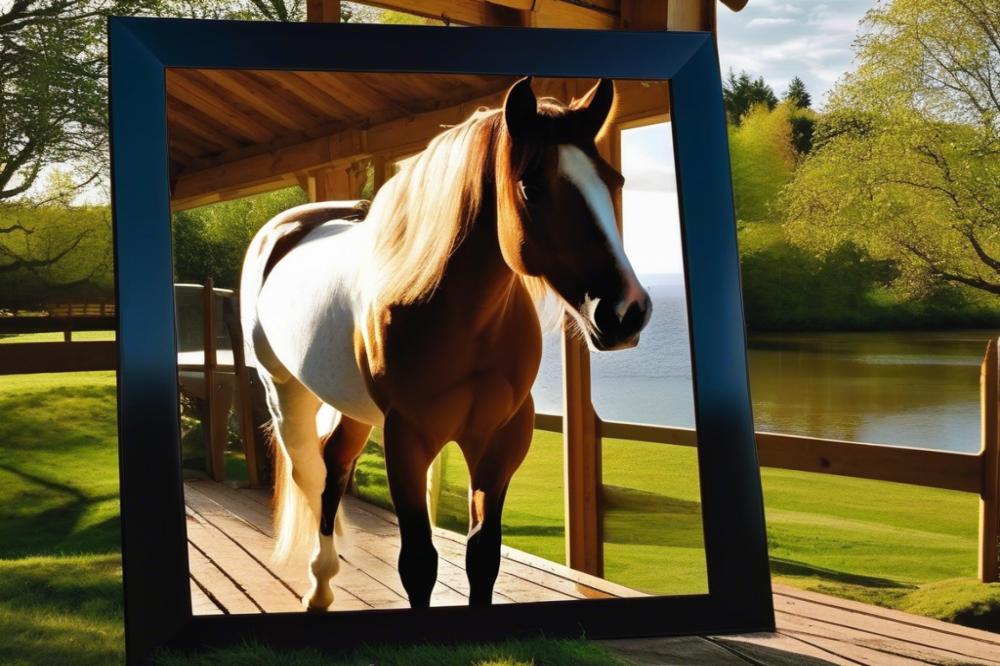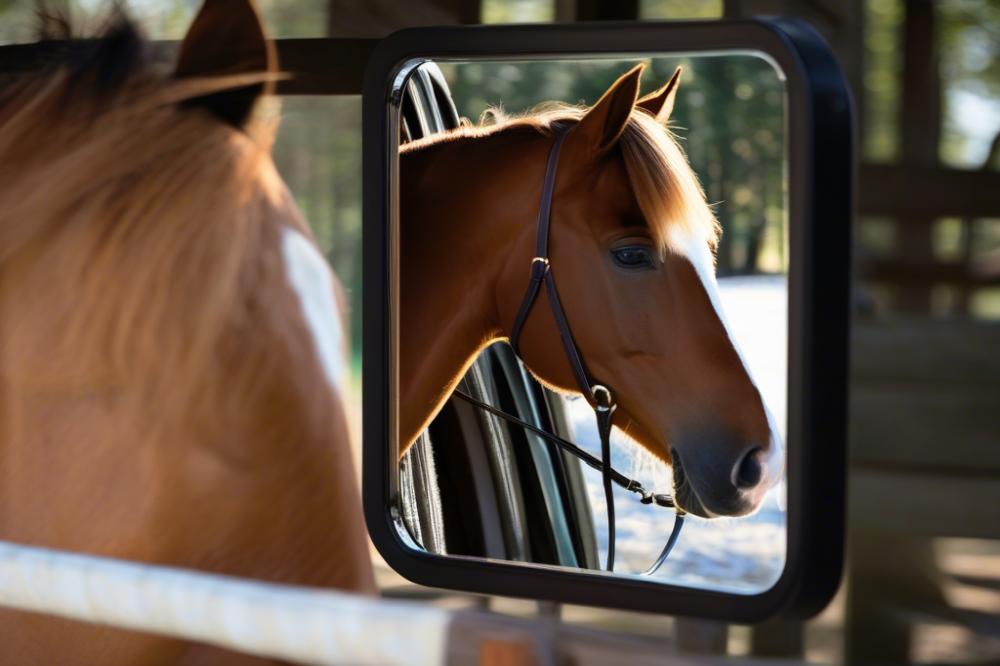Understanding Horse Self-Recognition
Have you ever looked into a mirror and wondered what your reflection thinks of you? It’s a curious thought, isn’t it? When it comes to our equine friends, the question of whether a horse can recognize itself in a mirror brings us into the fascinating world of horse psychology. Understanding this concept can unlock deeper insights into equine cognition and their self-awareness in animals.
Horse behavior is not just about galloping through fields or munching on hay. It’s a window into their intelligence and emotional lives. Cognitive studies on animals, including horses, often reveal surprising layers of awareness. For many, the mere act of self-recognition suggests a level of intelligence that some might underestimate. Horses are often viewed as large, gentle giants perfect for adults riding ponies. Yet, their mental capabilities can be as profound as their physical strength.
The realm of animal intelligence is vast and varies widely among species. Some animals, like dolphins and certain primates, pass mirror tests with flying colors. But where do horses fit in? Could a simple reflection hold the key to understanding their minds? Research into equine cognition opens doors to appreciating what lies beneath the surface of their bright eyes and expressive faces. Engaging with this topic isn’t merely a fun rabbit hole; it unveils critical aspects of how we view our animal partners.
Consider this: While we might think of the best war horse breeds as mere tools for battle, they held great significance in the lives of their riders. These horses exhibited loyalty, courage, and even strategic thinking in complex situations. In essence, their roles went beyond brute strength. Recognizing the potential for higher cognitive traits invites us to rethink how we interact with horses and understand them better as sentient beings.
As we delve deeper into whether horses can recognize themselves in mirrors, we also touch on the broader implications for animal awareness. The exploration of self-recognition reflects a growing understanding of the intelligence within the animal kingdom. Perhaps next time you see a horse, you might ponder not only about its strength but also what it knows about itself and the world around it.
Understanding Self-Recognition

Self-recognition is a fascinating ability. It refers to the capacity of an animal to identify itself in a reflective surface. When a creature sees its image, it knows that the reflection is actually itself and not another animal. This skill hints at deeper levels of understanding and awareness. It’s not just about having a pretty face!
One common way to test self-awareness is through the animal mirror test. In this experiment, an animal is marked in a place it can’t see without a mirror. If it uses the mirror to investigate the mark, that suggests some level of self-recognition. This test became famous in psychology and animal behavior studies. It offers insights into equine cognition and animal intelligence.
Many animals have passed this mirror test, showing they understand their identity. For instance, chimpanzees, dolphins, and elephants have all demonstrated this remarkable skill. These creatures often engage with their reflections, indicating they know they are unique individuals. Even some birds, like magpies, have shown similar abilities. What’s surprising is how diverse the list is!
When we think about horse behavior, the question arises: Can a horse recognize itself? While horses haven’t been the star of many mirror tests, they exhibit signs of self-awareness in other ways. Their social structures display a knack for individuality. Horses can identify other horses and even their human companions. So, it makes you wonder about their self-awareness! Understanding this aspect can lend insight into horse psychology, suggesting these magnificent animals might have more going on in their minds than we realize.
There’s something quite amusing about watching any animal approach a mirror. Some shy away, while others might try to make friends with what they think is another creature. It’s a comedy show waiting to happen! You can almost imagine them thinking, “Hey there, good looking!” The way this unfolds can be quite telling of an animal’s understanding of itself. While a horse may not stop for a hair flip, it still reflects a rich world of emotions and intelligence.
Overall, exploring self-awareness in animals opens up a world of questions. Each species has its own way of interacting with their environment and understanding themselves. Whether or not horses can recognize their own reflections, the journey into animal intelligence is endlessly intriguing.
Horses and Social Awareness

Understanding horses means diving into their social lives. Horses are herd animals, which means they naturally prefer the company of others. This preference shapes their behavior and interactions. Within a herd, horses establish complex relationships that rely heavily on recognizing each other. They communicate through body language, sounds, and even facial expressions. Imagine a group of friends; they receive cues from each other to maintain harmony.
Every horse has its own role within the herd. Some might be leaders, while others serve as followers. When animals live in groups, they need to recognize individual members. This need fosters a kind of social intelligence. Horses use their good memories to remember friends and foes alike. In fact, they can even form bonds with humans. That’s where the idea of horse psychology comes into play.
Equine cognition reveals that horses are very aware of their surroundings and social context. They seem to pick up emotional signals from one another. You might see them nudging a buddy when it feels down. This sensitivity requires a high level of awareness that some researchers suggest may indicate self-awareness in animals.
So, where does the animal mirror test come into all this? This experiment measures self-recognition by checking if an animal can identify itself in a mirror. While some animals, like dolphins and elephants, pass this test with flying colors, horses have not shown consistent results. They might see their reflection as just another horse, rather than an image of themselves.
Herd dynamics are also influenced by hierarchical structures. Dominant horses often lead the group, while others may maintain distance. Recognition plays a big role in this power balance. A lower-ranking horse wouldn’t challenge a higher-ranking one without understanding their relationships. A horse’s ability to navigate these social intricacies might suggest a level of intelligence that borders on self-awareness.
Horse behavior in social situations can lead to viewing their reflection differently. Some studies hint that recognizing another horse’s reflection might be easier for them than identifying themselves. Their focus might not even be on their image; it often centers on the idea of interaction. Imagine looking into a mirror and thinking, “Who’s that?” and then realizing the most pressing question is about who might be watching!
In short, horses are filled with social connections and emotional depth. Their reliance on recognition for social interactions emphasizes their rich, underlying cognitive processes. This might influence their self-awareness, though they may not have the same response to mirrors as other intelligent animals. After all, every horse has its own unique personality and quirks to navigate the rich tapestry of horse society.
Studies on Horses and Mirrors

Horses are fascinating creatures, and their ability to understand the world around them leads us to wonder if they can recognize themselves in a mirror. Various studies have examined how these animals react when they come across their reflection. Observations show that horses approach mirrors with curiosity, often tilting their heads or moving closer to inspect what they see. It’s clear that they notice something is there, yet what do they truly comprehend?
The animal mirror test is a well-known experiment designed to measure self-awareness in animals. Researchers have tried this test on various species, including primates, elephants, and even dolphins. For horses, the methodology varied. Some tests involved placing a horse in front of a large mirror to see if it would interact with its reflection in a self-aware manner. Others included hanging an object on the horse’s body and observing if the horse would check its reflection to investigate the strange addition.
Findings from these studies provide interesting insights into equine cognition. Many horses reacted to the mirror as if it were another horse rather than their own reflection. They would often try to socialize, nicker, or even show signs of distress, as if they were meeting a new friend—or an intruder! This indicates that horses may not possess the self-awareness we often look for in animals. However, it does not mean they lack intelligence. Their behavior clearly shows they are aware of their surroundings, just not necessarily of themselves.
Horse psychology adds an extra layer to our understanding of how these animals perceive the world. While they may not pass the traditional mirror test that measures self-recognition, this does not diminish their rich emotional and social lives. Horses communicate in a language of body movements and sounds, and it seems they might prioritize interactions with real companions over reflections.
Some researchers also argue that the absence of self-recognition could point to a different kind of awareness altogether. Maybe horses engage with sights around them based on their instincts and experiences, rather than the reflective self-identity we expect. It’s almost like they have their own set of rules in their social playbook!
Overall, while studies exploring self-awareness in these magnificent creatures are ongoing, they have yet to conclusively prove that horses understand their reflection as themselves. They may not recognize themselves in the mirror, but their responses tell us more about horse behavior and their cognition than a simple test might suggest.
Alternative Forms of Self-Recognition
When we think about self-awareness in animals, the focus often shifts to the animal mirror test. Yet, horses might show their understanding of self in other intriguing ways. Think of a horse that solves a puzzle to get a treat. Such cleverness indicates a level of equine cognition that’s hard to ignore. It’s like they have their own version of a brainy superhero moment!
Problem-solving skills can reveal a lot about horse behavior. If a horse is faced with a challenge, like opening a gate, how it approaches that problem can show its intelligence. Some horses will paw at the latch, while others might watch and learn from their buddy doing it. This indicates that they can think and strategize—both signs of self-awareness in animals.
Another captivating aspect involves empathy. Have you ever noticed how a horse can seem in tune with your emotions? Imagine riding and feeling a bit down. A sensitive horse might slow its pace or even nuzzle you. This ability to connect emotionally shows they might have a sense of awareness about others around them, which hints at deeper horse psychology.
Understanding human cues is yet another sign of intelligence. Horses often learn to respond to body language and voice commands. When they realize that a slight shift in your posture means it’s time to stop, that signals a level of awareness beyond just rote learning. They seem to pay attention and interact, almost like they’re having their own little conversations with us!
Consider a scenario where a horse seems hesitant to step over a shadow or an unusual object. This reaction could suggest they think something different is happening that warrants caution. After all, these are not just mindless creatures. Instead, they negotiate their environment much like we do. Some might say this is a reflection of their intelligence.
Self-awareness in animals may be complex, and horses express it in diverse ways. They show personality, emotion, and mind, crafting a picture of sentience that makes them more relatable. Who would have thought that behind those big eyes lies such depth?
So, the next time you see a horse in a field, take a moment to wonder what’s going on inside that lovely head. While they may not pass the animal mirror test, horses undoubtedly reveal their unique awareness through their actions, reactions, and connections with us. It’s a delightful reminder that intelligence comes dressed in all sorts of forms.
Comparative Analysis with Other Animals
When it comes to recognizing themselves in mirrors, horses are just one piece of a larger puzzle. Elephants, dolphins, and primates have made headlines for their impressive self-awareness. Understanding how these different animals perform can shed light on equine cognition.
Elephants have shown quite remarkable skills in the animal mirror test. Many elephants can recognize their reflections. They will often touch a mark placed on their forehead when they see themselves. This test demonstrates a level of self-awareness that not many species possess. Isn’t it fascinating to think about? If an elephant can check its own appearance, what’s going on in its mind?
Dolphins, too, are impressive when it comes to animal intelligence. They have passed the mirror test, sometimes even playing with their reflections. Imagine a dolphin swirling around, showing off its acrobatics in front of a mirror! This behavior suggests a deep level of self-recognition, pointing to a sophisticated understanding of their identity.
Primates, especially apes, share many similar traits with humans. Studies have found that several primate species pass the mirror test. These animals often show curiosity and even frustration with their reflections. Their reactions provide insights into their psychological framework. It’s almost like they are asking, “Hey, who’s that?”
Comparing these examples to horse behavior sparks interesting questions. While horses are highly intelligent and are adept at learning commands and signs, the evidence for self-recognition is less clear. They may not be as inclined to check themselves out in a shiny surface. Instead, they focus more on their environment, other horses, and humans. This does not mean they lack self-awareness, but their form of it might differ from what we see in elephants, dolphins, or primates.
Your average horse might be more concerned about what’s going on around them than how they look in the mirror. Would they even care? Perhaps it’s all about survival for them. That instinct is where horse psychology kicks in. They rely on their senses to navigate their world, and self-reflection might not be high on their list of priorities.
In understanding self-awareness in animals, we find that horses, elephants, dolphins, and primates all express intelligence differently. While it’s clear that some animals have an advanced grasp of their reflections, horses might engage their intelligence in ways we don’t fully appreciate yet. Each species offers a unique angle on what it means to think, feel, and know oneself in this vast world.
Implications for Horse Training and Interaction
Recognizing oneself in a mirror is a fascinating idea, especially when we think about how it relates to horses. If horses can truly understand what they see in a reflection, it opens up a new chapter in how we train and interact with them. Training methods could become more effective as we grasp horse behavior on a deeper level. By understanding equine cognition, trainers might be able to tailor techniques to better suit the individual needs of each horse.
Self-awareness in animals often leads to improved communication. When we acknowledge that a horse might have some level of self-recognition, it can change how we approach our daily routines. Imagine a horse who recognizes its reflection. It might feel more confident and curious during ground work. A horse that understands itself is likely to respond better to cues, making training sessions smoother and more enjoyable.
Understanding horse psychology can also greatly benefit welfare. If we realize that these animals have feelings and awareness, we can adjust our expectations. Less focus on strict discipline might lead to a more relaxed environment. Horses might thrive in a setting that respects their intelligence and emotional needs, just like people do when they feel valued. Training can be less about punishment and more about mutual understanding.
Humans have a tendency to overlook the intelligence of animals. Each interaction becomes an opportunity for learning. Picture this: you walk into a barn, and instead of a horse just bobbing its head, it actually looks back at its reflection with curiosity. This could signal a deeper connection between you and the horse. Such moments can strengthen the bond you share, leading to a more positive experience for both parties.
Utilizing this knowledge can also lead to safer training. Safety is paramount, and horses that feel understood and respected are less likely to become anxious or spooked. This can create calmer sessions, whether you are riding or simply spending time together. Horses that recognize themselves may show fewer signs of stress during interactions. With a little humor, one could say a horse that checks itself out is less likely to kick when it’s feeling pretty!
Furthermore, horse training can become a tailored experience. If we incorporate lessons about animal mirror tests and the insights they provide, trainers can craft better experiences suited to each horse’s unique personality. This approach allows for a more individualized plan, optimizing how every lesson is delivered. Trainers who respect animal intelligence will likely see positive outcomes, enhancing both performance and companionship.
Wrapping It All Up
Understanding whether horses can recognize themselves in mirrors presents quite the fascinating puzzle. Research has shown that these incredible animals often react to their reflections with curiosity rather than acknowledgment. They may seem puzzled, approaching the mirror and revealing a sense of wonder, but this doesn’t necessarily affirm that they recognize themselves like humans do. Instead, they might just think, “Who’s that other horse?”
Ongoing studies can shine a light on equine intelligence and emotional depth. It’s essential to remember that horses communicate in their own unique ways. They have expressive body language and their head, tail, and even horse ear meaning tell us volumes about how they’re feeling. All this highlights the fact that their understanding of the world is different from ours.
By putting more effort into equine research, we can learn so much about these majestic beings. Imagine discovering that horses can grasp concepts that humans once thought only certain animals could comprehend. Realizing the depth of what they understand can deepen our bond with them. Do horses understand humans? It’s an intricate relationship, isn’t it?
As we explore more about horse self-recognition, we may uncover layers of intelligence and emotional complexity that we never knew existed. Each finding can help foster a better understanding of how horses experience the world around them. So, whether it’s through a mirror or in person, let’s keep the dialogue going and embrace the captivating world of equine cognition. After all, the journey of exploration can be as rewarding as the destination itself.



